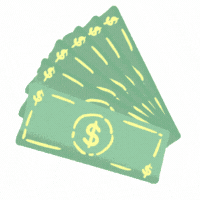When There’s No Money Left for Extras
by Gary Foreman

When there’s no money left for extras at the end of each month, what can you do? How can you improve your finances and stop ending the month with no money?
Dear Gary,
I have a common problem. I have been married for three years. Both my husband and I work full time. We have no children. Between the mortgage on our condo, one auto loan and credit cards we find a lot of times we don’t have extras. We are managing but I want to start saving and investing. Any suggestions?
Tina M.
The good news for Tina is that she’s identified a problem early enough to solve it. The bad news is that she really shouldn’t have the problem. Few of us should. So let’s explore what we can do when there’s no money left for extras.
We don’t save enough.
Tina is like many Americans. We just don’t save a lot. According to the Bureau of Economic Analysis, personal savings as a percentage of disposable personal income was 6.1% as of May 2019, which is better than past years but not as high as it should be for any family. What makes it especially bad for Tina is that the easiest time to save money is when a couple has two incomes and no children.
What can you do when there’s no money left for extras?
So if you’re in the same situation as Tina, how do you start to gain control?
Take your finances off of auto-pilot.
The first thing is to take your finances off auto-pilot. Just working hard and paying the bills won’t get it done. “We’re too busy” isn’t a good excuse. You need to know where you stand today and where you’d like to go in the future.
Figure out how much money you have coming in and where it’s going.
To find out where you are today, you’ll need some way to measure how much you’re making, how much you’re spending and what is the value of your assets after any debts are subtracted. That means you’ll need a system to keep track of your finances. You can do it with pencil and paper, but it will be better to use software or a spreadsheet like this tool from SimplePlanning.
Knowing your income and expenses is important. First, because you must make sure that your income is greater than your expenses. Many people fall into the trap of thinking that they can’t live on what they make. That’s a very dangerous idea. We all must spend less than we make. Sure, you can borrow money. But that means agreeing to pay interest on the money you borrow. If you can’t afford to pay cash for the item, paying for it later with interest added is going to be even harder.
Knowing where you spend money is also important because it will help you find potential savings. The best place to reduce expenses is where you’re spending the most money. If you spend $1 each day for lunch, there’s not much to save. But if lunches average $6 a day, then you’ve uncovered a source of potential savings.
Subscribe to After 50 Finances, our weekly newsletter dedicated to helping you plan for a comfortable retirement even if haven't saved enough. Subscribers get The After 50 Finances Pre-Retirement Checklist for FREE!
You deserve a comfortable retirement.
Subscribe to After 50 Finances, our weekly newsletter dedicated to people 50 years and older.
Each week we feature financial topics and other issues important to the 50+ crowd that can help you plan for a comfortable retirement even if you haven't saved enough.
Subscribers get The After 50 Finances Pre-Retirement Checklist for FREE!
We respect your privacy. Unsubscribe at any time.
Evaluate your net worth.
Next, you need to evaluate your ‘net worth’. That’s a business concept that can be very informative for individuals. Just list all your assets and then all your debts. Subtract your debts from your assets. The amount left over is your net worth.
It’s a great way to see if you’re making progress. Until you reach retirement, your net worth should go up each year. In fact, if you want to have a $40,000 annual retirement income, you will need to build your net worth to $600,000 or more.
Net worth is also a good way to take your financial temperature. More debts than assets? That’s a sign of sickness. And if that number approaches your annual income you’re a candidate for the emergency room!
Analyze how you use money.
Next you should take a step back and analyze how your family uses money. Tina mentions question that credit cards are a major expense for them. Perhaps they are for you, too. You need to find out why that’s true.
There are two possible reasons for high credit card bills. The first, and obvious one, is that you use the cards too much. Only use the cards for planned expenses. If you’re making unplanned purchases, it’s time to put the cards away. Studies show that people spend more when using credit cards.
Stop using credit cards for unplanned purchases.
The solution is to resolve not to use the cards for unplanned purchases. If that doesn’t work, stop carrying the cards. In extreme cases it’s best to destroy them to eliminate any temptation.
The second cause of high credit card bills is a balance from past purchases. The rule here is simple. When you’re in a hole, stop digging!
You also need to remember that the money you send to the credit card company is not a monthly expense. You’ve incurred an expense when you put a $40 dinner tab on your credit card. The interest on an account balance is also an expense. That’s important because you want to remember to think twice when you use the credit card. Not when you sit down to pay the bill at the end of the month. It’s too late then.
Will Debt Derail Your Retirement?
One of the most important ingredients for a comfortable retirement is to be debt free when you retire. This simple checklist can help you find out if debt could derail your retirement.
Start saving.
Once your income is greater than your expenses, it’s time to think of savings. An important part of any savings program are retirement accounts. A 401k plan is an excellent choice. Currently there’s over $1 trillion invested in 401k plans. The money grows without taxes until you withdraw it. Many companies match a portion of your savings. The money is withdrawn before you get a paycheck so there’s no temptation to spend it.
If your employer doesn’t offer a 401k, then an IRA is the next best option. No employer matching funds, but you can get the other benefits, especially if you routinely add money to the account each month.
Editor’s note: Individuals who are age 50 or over can make annual catch-up contributions to their retirement accounts. If you haven’t yet saved much for retirement, it is time to play catch-up with your retirement savings.
Paying off a credit card balance can also be a form of savings.
If credit card charges plus interest expense total $200 this month and you send a check for $300, then the extra $100 reduces your balance. That increases your net worth.
Extras are not guaranteed.
Finally, a philosophical note. Tina mentions ‘extras’. Not to pick on her, but extras are the things that you can afford after paying for necessities. Extras are not guaranteed. It’s never a good idea to use credit for something that’s not essential. And even then, you should have a clear plan of how you’ll repay the debt. It’s important because most of the people who are struggling with debt today started by buying a few extras with a credit card. And once started, they never stopped.
It can be worrisome when there’s no money left for extras. Hopefully, Tina and her husband will find that a little homework and planning will put them on the path to a long and successful financial future.
Reviewed January 2021
About the Author
Gary Foreman is the former owner and editor of the After50Finances.com website and newsletter. He's been featured in MSN Money, Yahoo Finance, Fox Business, The Nightly Business Report, US News Money, Credit.com and CreditCards.com.
Sign me up for a comfortable retirement!
Every Thursday we’ll send you articles and tips that will help you plan for and enjoy a comfortable retirement. Subscribers get a free copy of the After 50 Finances Pre-Retirement Checklist.
Sign me up for a comfortable retirement!
Every Thursday we’ll send you articles and tips that will help you plan for and enjoy a comfortable retirement. Subscribers get a free copy of the After 50 Finances Pre-Retirement Checklist.
Popular Articles
- Comparing Retirement Housing Options
- How We Retired With Almost No Savings
- How Retirees Can Live on a Tight Budget
- 9 Things You Need to Do Before You Retire
- What You Need to Know About Long Term Care Insurance Before You Retire
- You Didn’t Save Enough for Retirement and You’re 55+
- Could Debt Derail Your Retirement? A Checklist
- Your Emergency Fund In Retirement: A Comprehensive Guide
- Managing Your 401k In Your 50s



